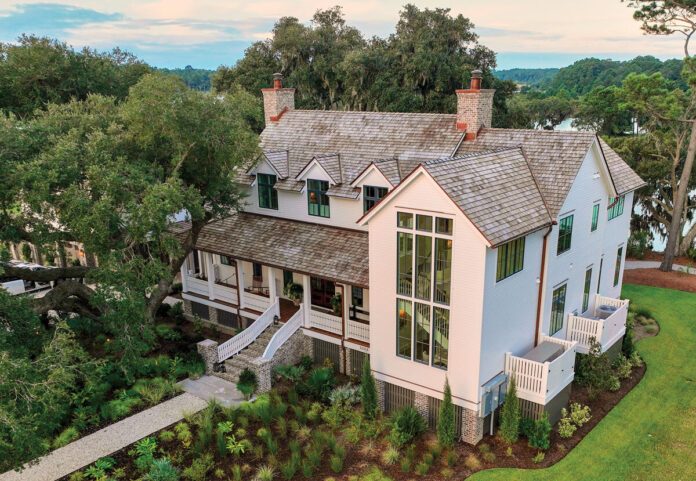How This Energy Source Enables Homes Anywhere
Propane Council Partners With Southern Living To Share The Benefits Of Propane In Unique Environments

As the housing industry continues to evolve, so do the challenges facing builders. With increasing scarcity for land and buildable lots, growing environmental concerns, and a rising focus of living off the grid and off natural gas lines, the flexibility to build anywhere has become a critical factor in home construction. Among the innovative solutions to these challenges is propane — an efficient, reliable, and eco-friendly energy source. Propane is increasingly being recognized for its ability to power homes in diverse and sensitive environments.
A prime example of propane’s versatility is its role in the 2024 Southern Living Idea House, nestled along the Kiawah River in South Carolina. This 4,400-square-foot residence not only showcases modern home design but also demonstrates how propane supports residential construction in remote, eco-sensitive areas. It allows homebuilders the freedom to build in locations where some energy sources are unfeasible.
One of the greatest challenges in homebuilding is finding land that is both available and buildable, while housing demand continues to grow. Single-family housing starts are expected to rise by 9 percent in 2024, with continued growth projected through 2025 and 2026. Notably, 58 percent of those houses are in new residential developments, including areas available for manufactured land and home packages, which may be off-grid and lack access to natural gas, similar to this project near the Kiawah River.
Propane is increasingly becoming the solution to these challenges. PERC president and CEO Tucker Perkins shares that residential consumption accounts for 50 percent of the propane used in the U.S.
“Homeowners today are prioritizing energy sources that are both reliable and eco-friendly. For this reason, we’re seeing more builders incorporate the use of propane in the residential construction space,” Perkins said. “Propane checks all the boxes — it’s clean, efficient, and resilient, making it a smart choice for builders and homeowners.”
The area around the Kiawah River is also part of a highly sensitive ecosystem, meaning it was critical that the home’s energy source would not pollute air, soil or waterways. Propane’s clean properties produce significantly fewer greenhouse gas emissions in a variety of applications compared to other energy sources. It is non-toxic, non-poisonous, and won’t contaminate soil or water. Propane is recognized as a clean alternative fuel under the Clean Air Act.
Tom Dillard, the builder of the Southern Living Idea House, emphasizes that propane’s flexibility and sustainability were key to making this project a reality.
“We’re the visitors here, nature was here first,” Dillard said. “Our job was to not impact that in any negative way, so using clean energy that would allow homeowners to enjoy living here was extremely important.”
The 2024 Southern Living Idea House operates on a 1,000-gallon buried propane tank, powering a variety of applications including the water heater, space heater, fireplaces, indoor and outdoor kitchens, pool heater, and its backup generator. The underground tank also offers aesthetic benefits and minimizes environmental disruption to the surrounding ecosystem.
“Propane allows homeowners to enjoy modern amenities while respecting the ecological values of the area,” Dillard said. “It’s an energy solution that doesn’t interfere with the natural beauty of the region.”
Research by the Propane Education & Research Council (PERC) shows that propane appliances produce 52 percent less greenhouse gas emissions compared to electric equivalents. And with the recent HUD code update, manufactured housing residents can now enjoy more of these benefits, allowing gas-fired tankless water heaters to be installed and shipped from the factory to homes.
Those benefits shine through in the Southern Living Idea Home. With more than 10 propane appliances in the home, Perkins says the home is projected to provide a 13 percent reduction in CO2 equivalent emissions compared to an all-electric home.
“When building in environmentally sensitive areas like coastal South Carolina, it’s crucial to use an energy source that does not harm the ecosystem,” Perkins said. “Propane supports high energy demands without sacrificing comfort, efficiency, or reliability.”
Building in hurricane-prone areas like South Carolina presents even more challenges. In August, Hurricane Debby hit the East Coast, leaving many without power. Propane’s reliability and resilience offer significant advantages in regions prone to extreme weather.
Will King, president of High Cotton Homes, has seen firsthand how propane’s versatility has made itself indispensable in disaster-prone areas.
“As a former firefighter and now builder, I’ve seen the devastation natural disasters can cause. And having lived through events like the 2011 tornadoes in Birmingham, I know how crucial it is to have reliable energy sources in place when the power grid goes down,” King said. “Whether it’s powering standby generators or prepping homes with transfer switches, propane gives homeowners the resilience they need to withstand extended power outages safely.
“What’s even more impressive is that a propane-powered generator can activate within seconds of a power outage,” he said. “It truly provides power when families need it most.”
As more homeowners seek to build in off-grid locations, propane will continue to play a pivotal role in supporting energy independence. The dream of building and living anywhere is no longer reserved for rustic cabins or off-grid minimalists — homes can now thrive wherever homeowners choose.
For those interested in learning more about how propane is shaping the future of residential construction, a live podcast recording was held Sept. 16 and featured Perkins alongside builders Dillard, King, and Matt Blashaw. The discussion covered the growing trends and insights of off-the-grid homes and the role that propane plays in making these homes both sustainable and resilient. To access the full discussion and learn more about the future of off-grid living, listen to the Path to Zero podcast episode at propane.com/ environment/podcast.
Bryan Cordill is the director of residential business development at the Propane Education & Research Council. He can be reached at bryan.cordill@propane.com.
MHInsider is the leader in manufactured housing news and is a product of MHVillage, the top marketplace for manufactured homes.










